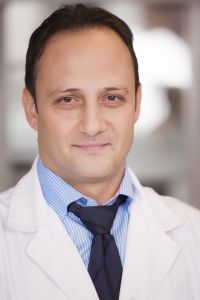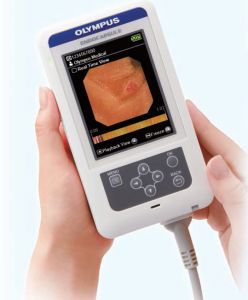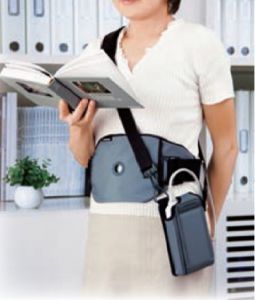Medicine of the future – capsule endoscopy.
ARS medical company is offering a unique method for intestine diagnostics using the most advanced endoscopy capsule system in the world.
Dr Sabri Abdul Massih (gastroenterologist and certified endoscopist) is talking about the newest treatment possibilities:

In Latvia, endoscopic capsules for small intestine examinations have been successfully used for over six years. Now the ARS medical company has procured the most up to date and modern second generation endoscopy capsule system Olympus Endocapsule 10 systems. We are one of the first clinics in the world using this most advanced capsule endoscopy technology. This unique technology offers future of the medicine today, exposing new horizons for diagnostics. It is believed that in the near future this method will improve even further – there will be capsule robots capable of delivering medication to a specific area and performing particular manipulations. Modernised capsule endoscopy provides more precise and progressive examination in comparison to older generation capsule systems, extinguishing any discomfort for the patient. The patient can return to their day-to-day lives whilst the capsule is doing its own intestinal investigation.
What is capsule endoscopy for?
Capsule endoscopy is a unique, non-invasive method of diagnostics for small intestine examination. However, if necessary, it can also provide information about the overall health of the GI tract. Whilst fibrogastroscopy is meant for upper GI tract examination and colonoscopy is meant for colon examination, capsule endoscopy focuses on the small intestine, located in-between the upper GI tract and the colon. The length of the small intestine can reach up to six meters and it cannot be examined using other endoscopy methods without proving very difficult for patient and doctor.

Indications: iron deficiency anaemia of unclear origin, bleeding in the GI tract of unclear source, Chron’s disease, inflammation, small intestine diseases, suspicions of tumour growth. It is also used to assess walls of the small intestine, for example, if someone suffers from celiac disease.
How does the examination take place?
Patient under doctor supervision swallow an activated capsule followed by a little water. There is no need to be nervous as the capsule is as small as many medicinal capsules. These capsules are made out of biologically and eco friendly materials that do not cause any side effects and are excreted from the organism naturally.

Once a capsule is swallowed it travels through the GI tract. It photographs everything in its way with a frequency of 2 images per second. It then transmits these images to a data device that is roughly the size of a mobile phone. When using older generation equipment, special sensors were attached to the patient’s body, now, however, the technology is wireless – antenna of the data device detects and registers information obtained by the capsule. The procedure lasts for 12 hours, during this time period the capsule takes around 70 000 photos. After a set amount of time, patients return to the doctor, inform him of any sensations felt during this examination and return the data device. Data from this device is transferred on to a computer and the doctor starts to analyse and process the images. It takes 2 – 4 hours and the results allow for efficient diagnostics of the small intestine.
Main advantages: this new capsule has a wider viewing angle, longer observation time – 12 hours, which is also the capsule’s battery time and is an improvement on the previous 8 hours, and modern 3D image detection technologies that substantially improve the examination.
For your knowledge:
-
If you do not have the time or do not wish to visit the doctor, home visits can be arranged for capsule endoscopy.
-
There is no need to stay in a medical establishment during capsule endoscopy; however, hard physical labour and swift movement should be avoided in order to avoid compromising capsule’s work.
-
This method is not allowed during pregnancy.
Useful information:
-
Capsules do not harm the patient during this procedure.
-
Anaesthesia is not necessary as this procedure is painless.
-
Capsules are disposable.
-
Capsules do not need to be returned to the medical establishment.
-
If a capsule is swallowed in the morning, drinking is allowed after 2 hours; a light meal can be had 4 hours after, later on patient can return to normal eating habits.
Preparing for the procedure:
-
No eating 12 hours prior the procedure.
-
Drink 2 litres of water.
-
The doctor needs to be informed about any regular drug intake for chronic illnesses. The doctor also needs to be informed if of any abdominal surgeries.
Important question: can the capsule get stuck?
Very rarely. However, it can happen if there are anatomical changes in the intestine – narrowing after small intestine surgeries or a formation. It can actually discover a new pathology that could cause serious complication risk in the near future. The material of the capsule presents no harm to the patient. It is possible to track the capsule instantly by looking at the monitor of the portable data device and see where it is and what it is doing. It is possible to view images taken previously while capsule continues its way and takes new photos.
For your knowledge: there are times after capsule endoscopy when a doctor may ask a patient to undergo follow-up upper endoscopy or colonoscopy to focus on specific areas, for example, if the capsule has discovered bleeding.
Without referral from a doctor
Capsule endoscopy is not designed to satisfy one’s curiosity or for fun. However, if someone wishes to pay and undergo the procedure, it cannot be prohibited. This examination is usually referred by a doctor and even then, only when there are complaints from the patient or suspicions about specific problems in the small intestine. Capsule endoscopy is not a replacement for fibrogastroscopy or colonoscopy.

